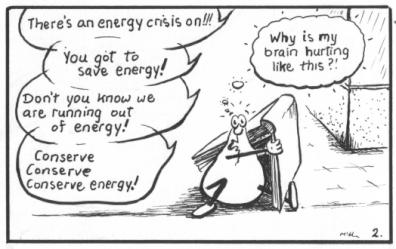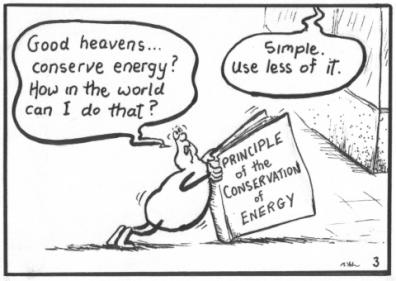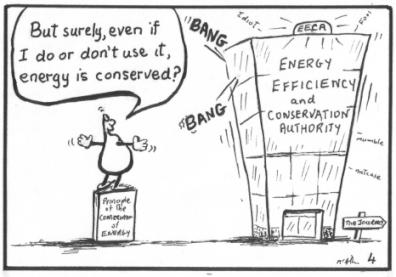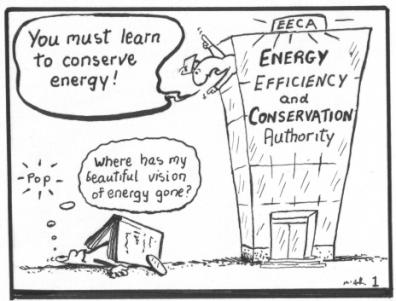Bonus Joules: Confusion or Concussion?
Confusion or Concussion?
Bonus Joules hears voices from another world.
Bonusjoules Blog 11 May 2005
Chapter 2.3 Concussfusion with EECA
Have you ever suddenly seen through a massive con? If you are like me, you don’t know whether to rage against the perpetrator, to be depressed by your ignorance or to laugh at your own gullibility. Of course, a lot depends on what you detect the motivation of the con artist is. Recently I experienced all those mixed emotions on scale. I discovered I had been conned on a grand scale by what some call the Neocons.
First I had better check out we agree what a Neocon is. It’s not easy. Google throws up Princeton’s rather unhelpful definition.
“ neoconservative : a conservative who subscribes to neoconservatism. “
It then adds to the circle of confusion:
"…an approach to politics or theology that represents a return to a traditional point of view (in contrast to more liberal or radical schools of thought of the 1960s) “
Wikipedia is much more upfront and makes far greater sense. It states:
“Neoconservatism is a controversial term whose meaning is widely disputed….Critics of the term argue that the word is overused and lacks coherent definition.”
It does seem that the Neocons ( neo means new) are very much associated with movements such as the Free Trade Movement. How confusing! This movement is basically a so-called liberalising mechanism for the radical stripping away of the attempts of communities to conserve their cultures and natural environments, thus providing the multinational corporations with unhindered access to community wealth.
Wiki also says that Neoconservatism and neoliberalism are both labels given to a strain of fiscally oriented conservatism that began in the 1980s.
The word fiscal rings bells and it is possible that I am indeed talking of the US Reagonites, the UK Thatcherites and New Zealand’s very own Rogergnomes. Whatever, the advent of these guys coincided with relatively high inflation and they imposed severe “fiscal remedies” to reduce it. A major feature of these remedies seemed to be the transfer of enormous quantities of wealth from the poor to the rich. And as inflation rates dropped, these economic whizzes and their media and university minions were able to claim their policies worked. I bet there are a lot of people like me who kind of swallowed their line even if we knew something was fishy in that we had become so much poorer in the process.
Well, what a con! I won’t go into the motivations of those who perpetuated it. I am sure some genuinely believe their fiscal measures solved that inflation. I give them the benefit of the doubt that they are just fools like me too. I now understand how our failures to conserve valuable resources such as soil, water, forests and fossil fuels will come home to haunt us as inflation in a thousand forms.
In my last blog I sounded off about those who live in a Lala Land where oil and gas flow in endless supply. I am a simple man and my hunch is that inflationary pressures will less ravage those communities that minimise their dependence on these resources. These are the smart ones that conserve the best land near their cities for growing a range of foods, that develop ‘smart’ electricity grids, that have rail systems that move a person with a thousands times the efficiency of a car and that invest in insulated dwellings rather than insularating motorways.
This makes my city, Wellington City, the Capital of New Zealand, the “Creative Capital” a prime candidate for becoming a local Centre of Inflation and Debt. We have built over the nearby market gardens, trashed our electricity grid, designed the city around cars and 80% of our dwellings are uninsulated. On the positive side, its great that our Council has recently reconsidered its decision to design the city around a V8 car race track. Congrats to Councillors – you will not regret your decision. Gentle hint: I am advised the money planned for the V8 race track is sufficient to provide a light rail track right down Jervois Quay to Courtney Place – which was the original sane plan of our ancestors.
I have just checked out my hunch on the relationship between oil and inflation. There is lots of e-stuff comparing the relative power of trade unions and inflation levels when oil/gas prices rise. My summary: weak unions= lower apparent inflation as lower-paid people carry the can. Others argue that the US, for instance, is more “energy efficient” now and uses less oil in the production of wealth because of the growth in service industries. Perhaps these analysts should hop out of their Lala Land SUVs more often*. All the US has done is transfer the demand for oil to their sources of manufactured goods now. China’s demand for oil is up 28% on this time last year. Anyway this argument is pretty irrelevant to New Zealand.

Click through to Bonus Joules Cartoon Strip
*Note: It seems many US citizens are indeed hopping out of their SUVs. News comes of Ford and GM getting bogged down to their windowsills as SUVs sales drop:
Ford and G.M. Suffer as Buyers Shun S.U.V.'sBy JEREMY W PETTERS
Published: May 4, 2005
DETROIT, May 3 - The latest automobile sales figures show that Americans are increasingly wary of gas-thirsty sport utility vehicles. That was particularly bad news for General Motors and the Ford Motor Company, which both saw their sales slip last month as consumers continued their steady march into Asian car companies' dealerships. ..
But even as sales were expanding for the industry, they were shrinking at G.M. and Ford. The decline was the sharpest at General Motors, the world's largest automaker. G.M.'s sales fell 7.7 percent from the same month a year earlier, primarily because of a weak demand for S.U.V.'s. The lack of appetite for S.U.V.'s also hurt Ford, which sold 5 percent fewer vehicles in April compared with a year ago.”
“Junk status for the two auto giants' debt will mean higher interest costs, further cutting into the beleaguered outfits' profits
General Motors (GM ) and its shareholders had been bracing for the bad news. But Ford Motor (F ) and its stockholders thought a cut to the outfit's credit rating was a little farther down the road. On May 5, Standard & Poor's downgraded the debt of both carmakers to junk status (see BW Online, 5/5/05, "GM and Ford: To the Junk Yard").
In a country driven by “patriotic” causes, GM and Ford should have noted sites like 40mpg.org. It has a poll indicating:
2 Out of 3 Americans see Buying More Fuel-Efficient Vehicle as “Patriotic.”
High Gas Prices Already Driving Half T Do So.
Could it be NZ Incorp. is heading for junk status too? I understand SUV sales have quadrupled in NZ since 2000. A lot of these are tatty looking second-hand imports. Maybe now we can pick up the US slack and import some lovely shiny new ones more in keeping with our Clean Green Image.
You think I am being facetious? I am not so sure. Over a decade ago I said to one of our present cabinet ministers that I thought Labour’s promotion of Jap imports in the 1980s was a recipe for disaster – gridlock, debt, waste etc. She replied that it had to be done – it was plain embarrassing for visitors coming here to see the old cars that people up the East Cape were driving around in and anyway they were entitled to a decent car. I figure we could have given East Capers a brand new car each, kept our Image and profited from savings in motorway expenditure, health bills and fuel imports in the cities.
Back to my search of proof for oil (gas)-inflation link. I strike an excellent site containing stuff that makes a lot of sense to me, the Energy Bulletin. Sure, the site has a very limited idea of the nature of energy but it does have an idea of the impact of oil costs. There is a good read on it, taken it from FutureReality.org
Will Higher Oil Prices Fuel Inflation?
by Ronald R. Cooke
Published on 15 Apr 2005 by FutureReality.org. Archived on 15 Apr 2005."A news story that compares the rising price of oil to the rate of inflation made the rounds of American media last month. Reporters, pundits and some economists repeated the parable without giving it much thought. The essential claim is that in 2005, higher oil prices will not drive up the rate of inflation as much as they did in the 1970s because oil consumption, as a percentage of GDP, has decreased by half since then. We have become much more efficient in our use of oil, claim the analysts, and therefore higher oil prices will only have a modest upward impact on inflation.
Rubbish.
Although the statement is true, the concept masks a lot of dirty little problems.
Here is why....
...And a final note. The model I developed for the American economy can be applied – with some revision of the assumptions – to the economy of any industrialized nation. Japan, France, Australia, South Korea – it doesn't matter.
Inflation knows no borders. It will be everywhere."

Click through to Bonus Joules Cartoon Strip
The article should be brain food for all those who represent communities – whether it be town and cities or groups of workers or car owners. Last week our union leaders came out arguing increased fuel costs must be offset by wage increases. That’s not going to help the poor in the Post Cheap Oil Age. Its better to push for revolving funds to insulate homes and provide smart local electricity grids, more effective public transport and other measures that reduce our dependence on oil and gas.
And I heard one trade union dumping on the Carbon Tax this week. That is doubly unhelpful. We live in the least energy efficient homes in the OECD. They are thermal shacks. Smart communities adopting the Carbon Tax and adapting their economies to it are at the forefront of technology. A by-product of that is much smarter and more sustaining dwellings for workers.
Same goes for our Automobile Association. 60 years of massive subsidies to private motorists have not made motoring anymore efficient and that inefficiency will compound now to destroy the quality of life of many AA members. Who do you really serve? Your members who have to get to work and freight goods across cities or the oil companies?
There’s gold in sunlight and Councils for their part can conserve and develop its generating potential. They should be conducting ‘solar audits” annually along with their financial audits. In my last blog I mentioned the war being waged by the bankers of the Bulk-electricity sector on the rights and ability of you and me to provide our needs from local technologies including small-scale electricity generation. Siting an insulated dwelling to the sun can be far more effective on every count but this recent article in The Guardian offers an example of those technologies.
Home wind turbines cut bills and pollution
Rooftop designs described as latest accessory for homeowners
Paul Brown, environment correspondent
Tuesday May 3, 2005
The GuardianA mini-wind turbine generating electricity could soon become the homeowner's latest fashion accessory - especially when people realise it could turn their meter backwards.
With potential sales in the millions, manufacturers have developed a series of designs to appeal to the discerning who both want to cut their electricity bills and feel good about helping the planet.
At a conference at the Building Research Establishment (BRE) in Watford, delegates from local authorities, civil servants, developers and manufacturers were shown several wind turbines costing less than £1,000 which can be fixed to urban homes or put on poles in gardens to provide electricity.
So simple have the devices become that some can simply by joined to the mains electricity supply using a standard 13amp plug - and to the annoyance of the electricity supply industry, if you produce more power than you can use when out at work or asleep, it turns your meter backwards as it supplies the neighbourhood....
Among the first customers was former the energy minister Brian Wilson, who had a wind turbine fitted to the side of his Glasgow home.
Government grants were available to homeowners and organisations like schools, paying around a third of the capital cost and installation.”
I love it! Its only autumn here and yet already my lounge is 11°C as I write. There is a brisk wind outside and a cool breeze in here around my ankles. I feel warmer already as I imagine a heat store radiating away using electricity from my wind turbine. And why am I left sitting in the cold? Well the bankers of the Bulk-electricity and gas sectors won big time with New Zealand’s Electricity Reforms of the 1990s. In fact they won huge time as it enabled them to trash just about all the potential of our communities to make intelligent uses of electricity.
The Reforms handed them control of your home in ways you probably cannot imagine. For a start you lost a small personal fortune when you lost control of your meter board. (Yes, you used to own it through your community – much more on this topic in my Electric Thinking section of www.bonusjoules.co.nz). Notice in the Guardian article the significant role of the meter in home-based generation of electricity?
Here in New Zealand the Bulk-electricity companies are trying to insist you must have two meters if you generate a couple of units of electricity a day. That keeps their lock on electricity use. Last I heard the Electricity Commission was still sniffing nervously around the issue like it could be a parcel bomb or an anthrax trap or something. And does it put the acid test on the real beliefs of our political parties!
Just say you use 10 units of grid-sourced electricity a day and generate 5 units yourself. With two meters the Government collects GST on 15 units. The article points out the 10 million meters in Britain are reversible and there are probably hundreds of thousands of similar meters here. Using a single reversible meter, a net flow of only 5 units is recorded and that household pays one-third the tax of the double-metered one. I expect parties like ACT and National who are always banging on that we are overtaxed to be out there picketing against any attempt “to tax us stupid with two meters.” If Labour is serious about its Kyoto commitments and about developing a “smart” resilient electricity grid in the Post Cheap Oil/Gas Age, it will be on the picket lines too.
The Electricity Reforms enable the siphoning off of massive bucks into the pockets of a handful of people. To give you an inkling, consider your meter rental. Most of our electricity meters are 20-30 years old and a brand new meter can be landed in NZ for $30. We pay a “rental” of $50 or so a year to the new owners of our dwelling’s meter. It is easy to figure that a few bods have pocketed at lease half a billion bucks pure cash flow this last decade. And this is but a trace of the total cash flow to the bankers of the Bulk-electricity sector.
This cash flow explains the extraordinary investment in Spin by the Bulk-electricity/fossil fuel sector as it attempts to re-engineer our images of energy to align with the short-term interests of their bankers. You can practically print money if you own the symbols of power and energy. How so? The words evoke the most vital and profound sensations we are capable of. Control the evocation of those sensations and you can frame a person’s worldview.
Our failure to understand the potency of the symbols associated with power and energy and the emotions they evoke in us leaves us extremely vulnerable to the attentions of the Spin merchants. This problem is compounded exponentially if you are a naive Educator or NGO. The Energy Imagineers can generate huge leverage off your ignorance. In last week’s blog I briefly outlined how Media Watch worked to enhance TransPower’s case, just as they failed to confront the real issues in their interview with Contact Energy last year.
Look at Greenpeace’s press statement this week:
Power Co. tries Greenwash at Sustainability Conference
Press Release: Greenpeace New Zealand
5 May 2005
The Greenpeace headline has beautifully reinforced the PR “power” spin and given extra momentum to the popular image of Bulk-electricity companies as the source of power and energy. The release was also a confused read for me till I realised they were not talking about PowerCo.
Greenpeace is firmly caught in the web spun by PR merchants, no matter how it agitates about issues. I am sure the NGO appreciates and endorses the vital role small-scale distributed generation will play in the creation of a sustainable electricity system. Greenpeace could have promoted it simply by abiding by fundamental science such as the Principle of the Conservation of Energy. Energy comes in many forms, including electricity sourced from small-scale generators. How much more helpful if their headline had read:
Bulk-Electricity Co tries Greenwash at Sustainability Conference
Greenpeace might have won their recent case in Court with Mighty River Power but the Bulk Generator won the real battle. It got invaluable advertising from it. The New Zealand Herald delivers truckloads of complementary copies of its issues into the nation’s schools each week in its efforts to promote its broadsheet as a “newspaper” . Its May 3 advertisement for the Bulk Generator was in the form of the headline:
Power giant fails to make protestors pay for guards.
Similarly a little more science would have made this scary article more sustaining:
Global Energy –How much Remains?Wednesday, 4 may 2005-05-10 Article: Pacific Ecologist.
Its not a cheerful read. The article basically implies that our children will be the last of humanity:
“World total energy consumption in 2001 was 404 Quads (=4.22 x 1020 Joules). Assuming non-renewables continue to supply 92% of total energy, and the rate of consumption continues to rise at 2% pa, simple arithmetic shows the non-renewable energy endowment calculated for Case 1 would last until 2054, and for Case 2 until 2076.”
A hint that images of energy are skewif (skew-gee if you are speak American) is found in the table showing sources of energy (Non Renewable sources- Oil, Natural Gas, Coal, Nuclear and Renewable sources - Hydro, Other). The US Energy Information Administration generated the table. Such agencies are often the home of purest Energy Gobbledygook. They wouldn’t know energy from an energy form if they were dropped in a universe pulsing with energy in a myriad of forms.
The table does note their figures probably understate the amount of energy in the Third World coming from traditional resources of dung and firewood. I wonder if they count it when I sit in the sun to keep warm? The point is energy comes in forms we use and also in many forms we don’t use because we are silly, shortsighted, lazy, greedy, duped or ignorant. I will let Geocities put the 404 quads of energy quoted into perspective:
“The earth’s outer atmosphere intercepts about one two-billionth of the energy generated by the sun, or about 1500 quadrillion (1.5 x 10 E18 ) kilowatt-hours per year. Because of reflection, scattering, and absorption by gases and aerosols in the atmosphere, however, only 47% of this, or approximately 700 quadrillion (7 x 10 E17 ) kilowatt-hours, reaches the surface of the earth.”
Put another way, more sunlight energy falls on our Earth in 24 hours than all of the energy we ever had or ever will use from using oil. This solar energy is some of the “Other”, the remaining 1% of “Global Energy”.
Living such limited images of energy causes us to lose touch with our Thermal Beings and we forget how to dance with the thermal flows. For instance, those 700 quadrillion kWh that reach Earth create a massive potential in temperature differences in the top meter of the soils, in the air and in the oceans. With care and moderation, our backyards can supply many of our requirements for a good life.
By confusing energy with those few energy forms the article works to breed a climate of confusion, deprivation and fear – the perfect breeding climate for the PR Spin I spoke of earlier.

Click through to Bonus Joules Cartoon Strip
Which brings me to the subject of the cartoon strip: The Energy Efficiency and Conservation Authority (EECA). I have run out of time and will leave you with this question: If science is right and energy is conserved, then what happens to humans who think they can conserve energy? Do they live in a miserable world of fear and deprivation and use valuable energy forms as if they are boundless energy itself?
Oh, and before I go I should explain this format. You may be finding it all a little strange. The Bonus Joules cartoon was drawn as a web log starting about three years ago. These blogs and the cartoon in its original format can be viewed via the update page at www.bonusjoules.co.nz If you are reading it on a news service like SCOOP the format is a little different. If your network has sourced it off SCOOP it is a bit different again. What was to be a historical blog on the cartoon blog has become more of a topical weekly blog spliced with the cartoon blog. And yes, I witnessed the shutters in action at EECA in 2001.
As a friend in India signs off every email: “More in my next email”.



 Binoy Kampmark: Condemning The Right To Self-Defence - Iran’s Retaliation And Israel’s Privilege
Binoy Kampmark: Condemning The Right To Self-Defence - Iran’s Retaliation And Israel’s Privilege Gordon Campbell: On The Making Of King Donald
Gordon Campbell: On The Making Of King Donald Binoy Kampmark: Rogue States And Thought Crimes - Israel Strikes Iran
Binoy Kampmark: Rogue States And Thought Crimes - Israel Strikes Iran Eugene Doyle: The West’s War On Iran
Eugene Doyle: The West’s War On Iran Richard S. Ehrlich: Deadly Border Feud Between Thailand & Cambodia
Richard S. Ehrlich: Deadly Border Feud Between Thailand & Cambodia Gordon Campbell: On Free Speech And Anti-Semitism
Gordon Campbell: On Free Speech And Anti-Semitism